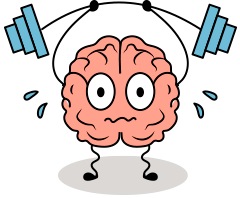Resilience vs. resiliency, both words have the same meaning. Both terms refer to one’s mental and emotional ability to recover from life challenges of hardship, illness, or depression. Therefore, resiliency is one’s state of being resilient. When you are resilient, you overcome and adapt to challenges quickly when life throws you curve balls. Accept, release and look for a solution instead of focusing on the problem.
Are You An Resilient Person? Resilient Person Meaning
Are you a person who can’t seem to find your feet when life throws you down? If so, you’re likely suffering from low resilience. People with high resilience do it naturally or have built the skills to adapt to challenging situations. Conversely, individuals with low resilience can suffer greatly.
When faced with stressors, challenging tasks, or anything else that might get in the way of your day-to-day activities, individuals with higher resilience can maintain their balance and move forward quickly; those who have lower levels of resilience may struggle.
Learning to Deal with Stress Improves Your Resilience
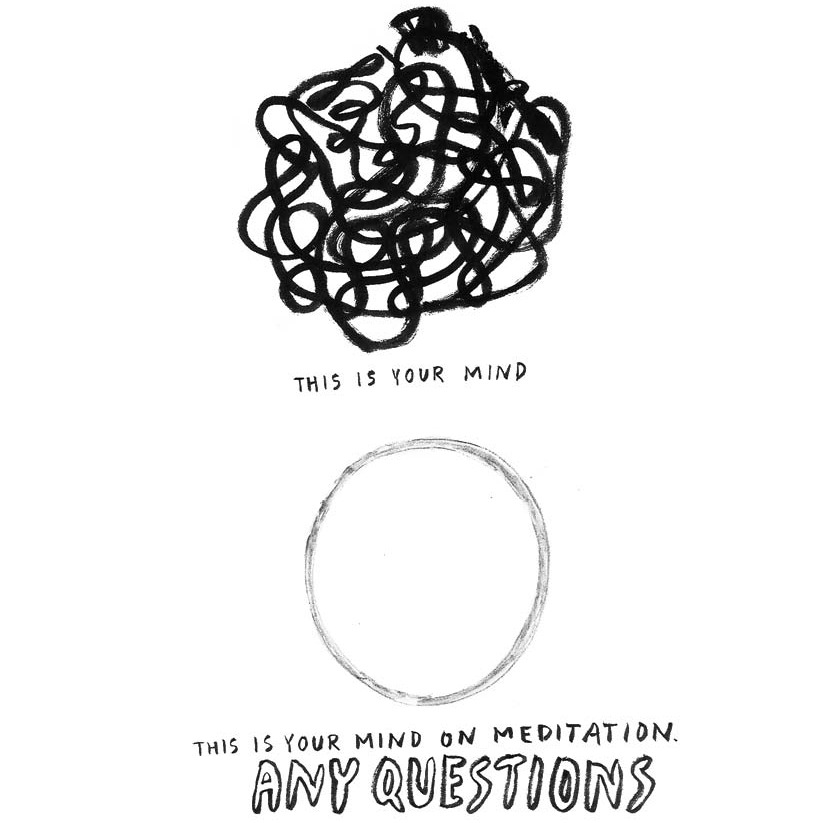
Learning to Deal with Stress Improves Your Resilience. The American Psychology Association (APA) defines resilience as the process of how well individuals adapt in the face of adversity, trauma, threats, and tragedies in life. Such types of stress include relationship problems, family issues, financial stressors, workplace stress, serious health issue, and the death of a loved one are all hard knocks.
Thanks to resilience, individuals generally adapt to adverse situations well over time to life-changing and stressful situations. As hard as it may seem to bounce back from painful experiences, it also involves profound personal growth.
Everyone Experiences the Traumatic Events of Life-build resiliency.

Emotional stress and pain are commonly experienced, and the road to resilience is likely to involve considerable emotional distress. However, when we get knocked down, we have the opportunity to look at the situation from a different perspective. There are always solutions to every problem or situation at hand.
There may be certain factors that make some individuals more or less resilient than others. When adverse events knock us down, they are complex and painful. However, these extreme events do not determine your life’s outcome. You can control, modify, and experience growth in many aspects of life. That’s the role of resilience. The more resilient you become, it helps you through tricky times with empowerment to grow and improve your life.
Resilience is NOT
When you are resilient, it does not mean you will never experience distress or difficulty, that is just life, and it is forever changing. Emotional pain and stress are common experiences when faced with significant adversity or trauma. The road to resilience is likely to involve considerable emotional distress. Resilience indeed involves behaviors, thoughts, and actions in which we all can learn and develop. Research shows resilience is ordinary, not extraordinary.
Build Your Resilience Muscles
It takes intent and time to build your resilience muscles. Here are four components you can work on.
- Healthy Thinking
- Meaning
- Connection
- Well-being
Focusing on these few strategic components can empower you to handle and learn from complex and traumatic times when life knocks you down.
Accepting Life’s Changes- build resilience
Noting in this world is fixed. Everything and everyone is experiencing changes consistently. From the world, we live in as a whole, right down to each individual. Many are subtle, and then we have the significant changes that throw us for a loop. It is part of life, no one can escape it, but we can learn how to get through those changes with grace and less friction. Accepting that change IS part of life. When you accept your circumstances that you cannot change, it helps you focus on the circumstances that you can change.
Optimistic Outlook Empowers-
When life knocks you down, maintain a hopeful outlook. It is not easy when life has you down. However, there is the empowerment you will experience when you expect good things to happen in your life. Things just get better faster. So, visualize what you want instead of worrying about what you fear. Then, as you deal with difficult times, note why you begin to feel better.
Lessons Learned
Learn from past struggles. Look back and acknowledge where and who was there that helped you get through past upheavals. Where were you able to find strength? Bring awareness to how you can respond effectively to new difficult circumstances. Then ask yourself, “what have I learned from these past experiences?” You will probably be surprised with the answers that come to mind that push you through with strength.
Find Your Purpose-Benefits of Resilence
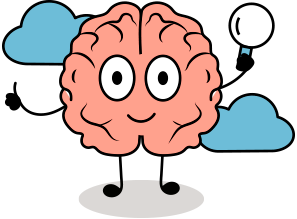
Many people put too much thought or pressure on themselves when they hear, “find your PURPOSE. Many think “I don’t know what that is” and “what am I supposed to be doing in or with my life.” They make these thoughts way more complicated than needed. It is not complicated, for finding your purpose means “do what makes you happy, and brings joy to your life. Just ask yourself these questions. What do I love to do? What is that, something you have always wanted to do, but fear held you back? Anything that brings you joy, from dancing, art, crafts, or helping others. So don’t hold back; write a list of everything you would love to do that brings you happiness and joy. That is your PURPOSE!
- Helping others in some way brings immense joy to some individuals. Whether it’s volunteering at your local homeless shelter or food bank or just giving support to a friend in need, these types of actions can provide individuals with a sense of purpose and increase the feeling of self-worth. In addition, it empowers you and builds resilience.
Build Relationship Connections
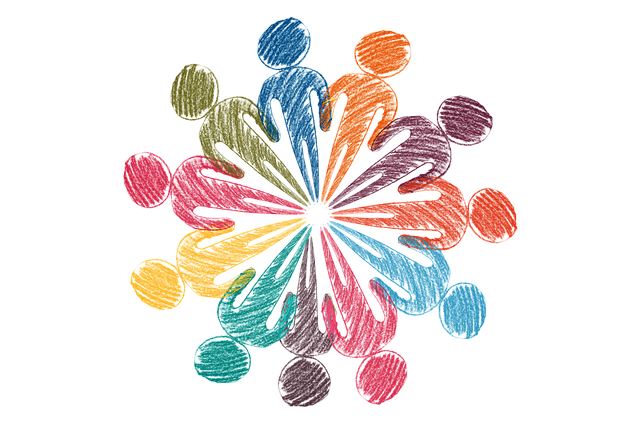
Some individuals thrive by being active in civic groups. Joining community organizations, faith-based, spiritual, craft groups, painting, etc… Any local group organizations that could offer you support with a sense of joy and purpose when needed. Though one on one relationships are beautiful, groups can lift you with hope in times of need. It helps you have a forward outlook on life with compassionate people around you. Building relationships with trustworthy, understanding, compassionate people reminds you that you’re not alone.
Some individuals suffering from the pain of traumatic experiences then isolate themselves. However, there are times for much-needed self-reflection, but it is of the utmost importance to accept help and support from people who genuinely care.
Take Care of Yourself-build resiliency.
Stress is just as physically painful as emotional pain is. Self-care is an essential practice for mental health and building resilience. Here are a few ways to practice self-care.
- First of all, don’t beat up on yourself
- Get plenty of sleep
- Proper nutrition
- Staying hydrated
- Strengthen your body with regular exercise. Exercise helps you adapt to stress, anxiety, and depression. Reducing the harm stress and anxiety have on the mind and body. Take simple walks for 30 minutes a day. Practicing Yoga or Tia Chi are great ways to exercise, for they include focused breathing and bring awareness to the body.
Don’t Put Band-aids on Deep Wounds-Build Resilience

Many are tempted by negative outlets, such as drugs, alcohol, or other substances, in an attempt to mask their pain and fears. Instead, focus with the intent to provide resources to your body that help manage stress rather than push it down. Meditation is a wonderfully healthy way to improve your resilience in difficult times. In fact, meditation can bring improvement and strength to all areas of your life. As a result, you are strengthening your resilience to face future challenges more easily.
Be Proactive-
It is important to accept where you are now. Acknowledge and accept your emotions in troubled times without judging yourself or others, for this serves you Not. It is vital at this stage to look towards a solution instead of focusing on the problem. Ask yourself some more questions “What can I do about the situation I am facing in life right now? If the problem is too big, break it down into smaller, manageable parts.
Move Towards Your Goals–Build Resilience
Make realistic goals, don’t make them too big where it’s almost impossible to reach the moment. Break big goals down into smaller parts and work on something regularly. Every small step takes you closer to the things you want to achieve. Place your focus on the one thing you know you can accomplish today. That one thing helps you move one step in the direction you want to reach. Taking the initiative one step at a time reminds you that you can muster motivation and purpose even during hard times. Focusing on the tasks at hand increases the likelihood that you will rise during painful times again. Resilience building in the making every step of the way. You can do it!
Self-discovery-
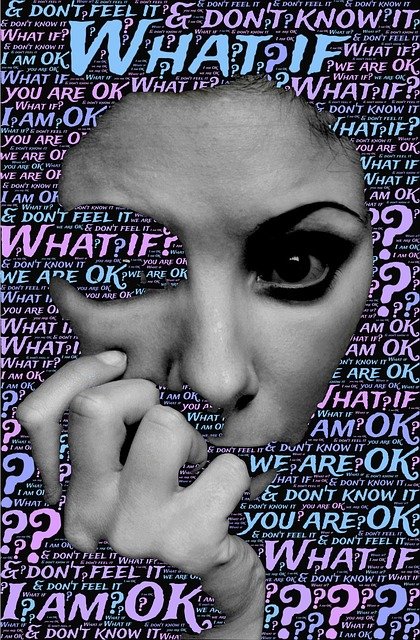
Look for opportunities for self-discovery. Many individuals acknowledge how much they have grown in areas of life due to struggle. Individuals come out the other side of adversity with solid relations and a greater sense of inner strength, even when they feel vulnerable. Self-worth and appreciation for life are significantly enhanced.
Keeping Things In Perspective-
It is scientifically proven the mind-body connection does exist. When you think, it impacts how you feel and your resilience to life’s struggles. If irrational thoughts like assuming the world are out to get you are present in your day-to-day life, try adopting a more realistic way of thinking!
The world around us shapes our thoughts and emotions. But what if those thoughts and emotions were the shapes of the world? What if you could change your mind to change your life? It all starts with a thought, so embrace healthy thinking patterns that will help you adapt to more realistic and balanced thinking patterns.
You may not be able to change your life situation, but you can remind yourself you are not helpless. What is going on in the negative life situation now does not determine your future. You can change how you interpret and respond to any challenges in life.
Meditation Builds Resilience-
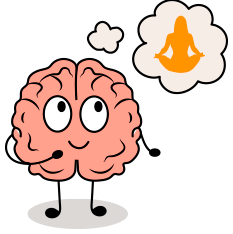
Meditation is a great way to deal with stress, anxiety, and the issues that knock you down in life. Practicing daily meditation for just 10 to 20 minutes a day can significantly improve resilience. You learn skills that show you how to deal with life’s challenging situations. You can learn to be calm, centered, focused, and free just by learning how to handle stress in a healthy, productive way.
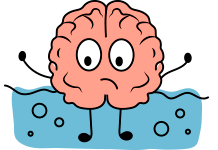
High stressful situations flood the body with cortisol stress hormones, and with prolonged stressors, these stress hormones cause illness in the body. From diabetes, chronic pain, high blood pressure, mental illness such as depression, or worse, even cancer.
Research on meditation and its health benefits is prevalent and positive. As a result, pain clinics and other physician offices are prescribing it for their patients. Studies also report how meditation can prevent physical and mental illnesses like anxiety or depression.
Learn the Skills of Resiliency
Meditation can teach you to stay calm, centered, and focused in any life situation. Helping you deal with adversity, therefore taking the hard hits from life won’t knock you down so hard. Instead, you will bounce back with much more ease, for you have learned how to build resilience healthily.
The Calm, Centered, and Focused Life
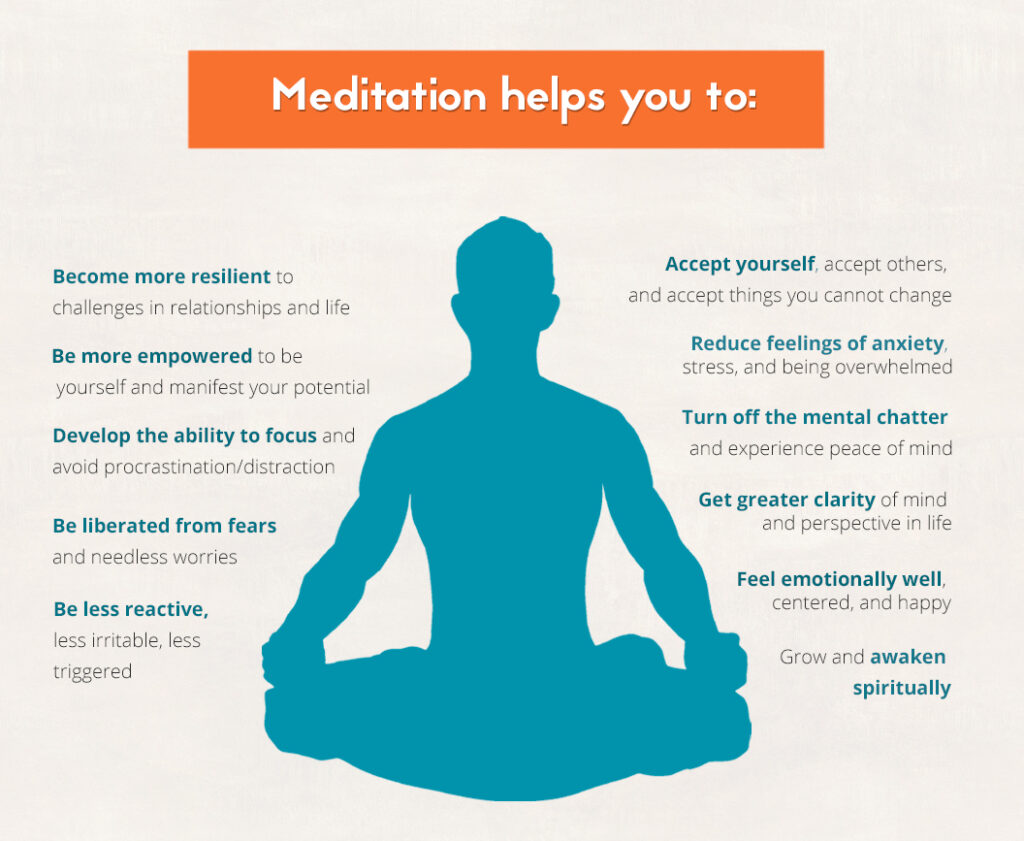
What happens if you start taking good care of yourself, with your mental and emotional fitness? Anxiety and stress decrease, and well-being increases.
Here is what a diary entry could look like in the life of the anxious human after a good dose of mental fitness.
Journal Entry: benefits of resilience
I wake up feeling well-rested and replenished after a good night of sleep. My body feels relaxed and light.

The thought comes that I have some pretty challenging things coming up for me today at work. So my mind goes around that a little bit, but then I decide to get up and do my short morning meditation.
After meditating, I feel calm and clear. There is this sense of ease and flow in my body. Meditation gives me a sense of control over my mind and my life. There is this distance between me and my thoughts, so they are easier to manage.
I feel more confident that I will be able to deal with whatever challenges arise today because I know my strength and trust myself. As a result, there are fewer things to worry about.
Remembering How Things Use To BE
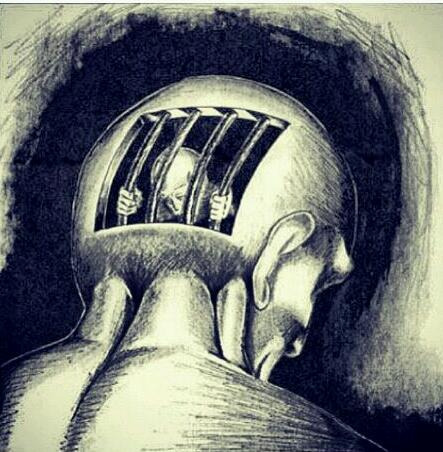
I then remember how things used to be for me, and I was not in a good place and didn’t have a strong center—even though I could not fully see it at that time. Looking back, it feels like I was living inside a cage of my own making.
Now things are pretty different. I’m engaged in a journey of growth and self-transformation with others. As a result, I take better care of myself, with more energy for my goals and priorities, and feel happier with who I am.
My moods are much more stable. I’m less reactive and consistently feel better in my skin. No matter what happens, there is a sense of calm and contentment in the background. I’m more optimistic and feel more in control of myself and my life.
Even when negative thinking arises, or if anxiety tries to raise its head, I know exactly how to deal with it. My resiliency to anxiety and stress doesn’t define me anymore. I choose who I want to be, moment after moment.
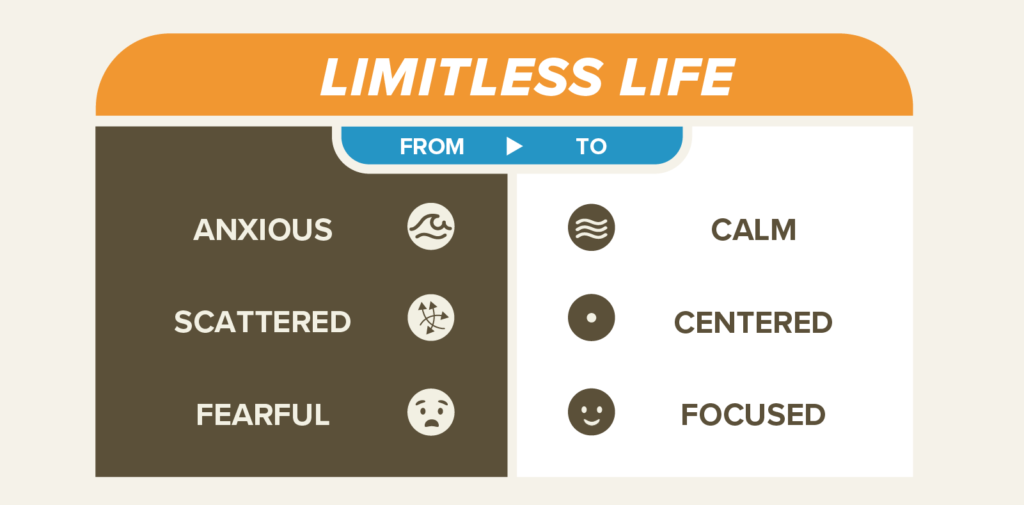
This type of transformation happened to me; fortunately, it also happened to many others.
With the right tools, guidance, and support, it can happen for you too!
Do You Want A Higher State Resiliency?

Click the button below so you, too, can learn how the Limitless Life Meditation program can help you reach higher states of resilience and overcome adversities in challenging times by removing the pain of the big stings. Learn the skills you need to achieve your highest state of strength potentially.
Go Ahead and Click The Button Below!

Disclosure: Bear in mind that the button link above in this post is an affiliate link, and if you make a purchase, I will earn a commission at no extra cost to you. Keep in mind that I link this company and its products because of their quality and the positive impact on people’s lives, not because of the commission I receive from your purchases. The decision is yours, and whether or not you decide to buy something is entirely up to you.
How to Achieve Success? 10 Ways To Create Positive Change https://1111newme.com/2022/08/05/how-to-achieve-success-10-ways-to-create-positive-change/


